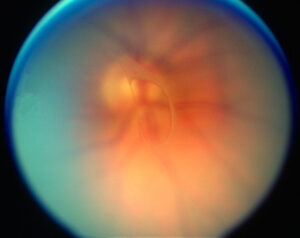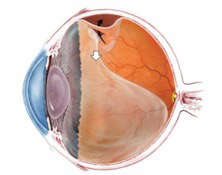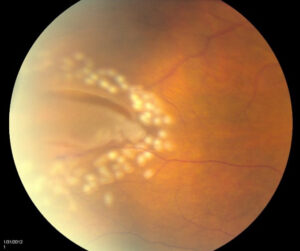Floaters appear as small spots that drift through the field of vision. They present in any shape or size but are commonly described as circular dots, squiggly strands, or cobwebs. They are called floaters because they move around in the eye and tend to dart away when focusing on them.
Most floaters come from the natural collagen fibers in the vitreous, a gel-like substance filling the core of your eye. These fibers cast a shadow on the retina. It is normal for people under the age of 50, especially those who are near-sighted, to see floaters chronically; more so in certain lighting conditions.
However, when sudden onset of new floaters appear, it is commonly due to a vitreous detachment. Vitreous detachment typically occurs between the ages of 50-75 and is a natural phase in the aging of the vitreous. The separation can be vigorous enough to cause flashing lights from the electrical stimulation of retinal cells.


By Alex P. Hunyor, MD from Retina Image Bank, 2013
Sometimes the vitreous tears the retina as it separates. A retinal tear is considered an urgent condition requiring evaluation and treatment due to the risk of progression into a retinal detachment. Therefore, patients with new floaters and/or flashes should be evaluated within 1-2 days of onset to evaluate for the possibility of tears. Without a careful examination by a qualified eye care provider, there is no way to know if a tear is present.

Conditions that increase the risk of retinal tears include nearsightedness or myopia, previous ocular surgery such as cataract surgery, previous ocular injury, history of retinal detachment in the other eye, and family history of retinal detachment.
Early evaluation and treatment are critical as most retinal detachments, which usually require surgical intervention, can be prevented if tears are detected and treated early. Treatment of retinal tears usually involves an in-office laser treatment which usually prevents retinal detachment.

By Jason S. Calhoun from Retina Image Bank, 2013
Photo of retinal tear after laser treatment to prevent retinal detachment.

By Jason S. Calhoun from Retina Image Bank, 2013
Photo of untreated retinal tear which led to a retinal detachment.

